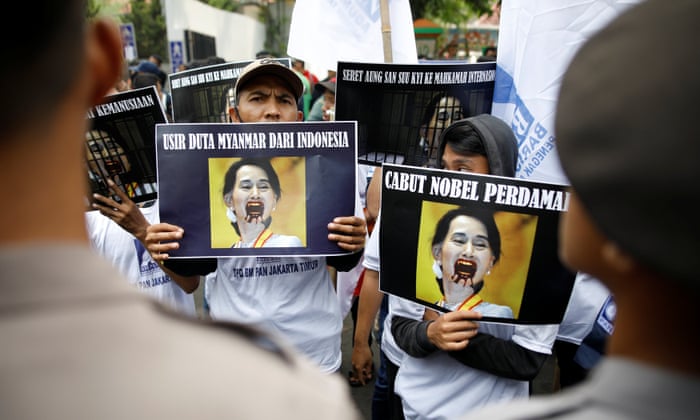Aung San Suu Kyi says 'terrorists' are misinforming world about Myanmar violence
De facto leader responds to growing international criticism by attacking ‘fake news’ about the plight of Rohingya Muslims

Protesters hold placards critical of Aung San Suu Kyi at a rally in Jakarta this week. Photograph: Darren Whiteside/Reuters
 Michael Safi in Delhi-Wednesday 6 September 2017
Michael Safi in Delhi-Wednesday 6 September 2017Aung San Suu Kyi has blamed “terrorists” for “a huge iceberg of misinformation” about violence in western Myanmar that has forced more than 140,000 Rohingya refugees into neighbouring Bangladesh.
The de-facto leader of Myanmar is under growing pressure to halt “clearance operations” by security forces in Rakhine state that the United Nations secretary-general has warned could verge on ethnic cleansing.
A statement posted by Aung San Suu Kyi’s office to Facebook on Wednesday said she had spoken with Turkey’s president Recep Tayyip Erdoğan about the crisis that he has repeatedly called a “genocide”.
She said the government “had already started defending all the people in Rakhine in the best way possible and expressed that there should be no misinformation to create trouble between the two countries”.
She referred to “fake news photographs” posted on Twitter by Turkey’s deputy prime minister that purported to show dead Rohingya in Myanmar, but in fact were taken elsewhere.
“That kind of fake information which was inflicted on the deputy prime minister was simply the tip of a huge iceberg of misinformation calculated to create a lot of problems between different communities and with the aim of promoting the interest of the terrorists,” the statement said.
About 146,000 Rohingya people – an estimated 80% of them women and children – are now thought to have crossed into Bangladesh since 25 August, when militants from the ethnic Muslim group attacked dozens of security sites. Authorities responded with a crackdown that UN officials in Myanmar say may have killed up to 1,000 people.
Satellite images show evidence of arson and Rohingya refugees in Bangladesh have claimed their villages are being burned en masse. UN agencies have been barred from providing humanitarian aid in the state and journalists are prevented from entering.
Hindu and Buddhist villagers have also reported being targeted by Rohingya insurgents but the Muslim-minority group, who are denied citizenship and access to basic government services in Myanmar, make up the vast majority of those displaced.
Myanmar has been laying landmines across parts of its border with Bangladesh in recent days,
government sources in Dhaka have told Reuters. The sources speculated that mines have been placed to prevent Rohingya refugees from returning to Rakhine state.
Bangladesh is reportedly preparing to lodge a protest against the placement of the mines so close to the border, but a Myanmar military source told the agency the explosives had been in place since the 1990s.
The UN chief, Antonio Guterres, issued a rare letter on Wednesday appealing to Myanmar authorities to “put an end to this violence that, in my opinion, is creating a situation that can destabilise the region”.
Asked if the violence could be described as ethnic cleansing, Guterres told journalists on Tuesday: “We are facing a risk, I hope we don’t get there.”
His intervention was part of a chorus of appeals by world leaders for Aung San Suu Kyi, the 1991 Nobel peace prize winner, to exercise influence over the military leaders that controlled the government for decades until 2015.
The British foreign secretary, Boris Johnson, said in a statement earlier this week: “Aung San Suu Kyi is rightly regarded as one of the most inspiring figures of our age but the treatment of the Rohingya is alas besmirching the reputation of Burma.”
Aung San Suu Kyi on Wednesday met the Indian prime minister, Narendra Modi, whose government is competing with China for influence in the south-east Asian state.
The Modi government says it is setting up a task force to identify the estimated 40,000 Rohingya believed to be taking refuge in India. A cabinet minister, Kiren Rijiju, said on Tuesday that Rohingya people in India were “illegal immigrants and need to be deported as per law”.
Human rights lawyers in Delhi are challenging the government plan and the supreme court this week ordered the Indian government to explain its position by 11 September.
After the meeting Modi issued a statement saying he shared the Myanmar’s government’s “concerns about extremist violence in Rakhine state and the violence against security forces and also how innocent lives have been affected”.

